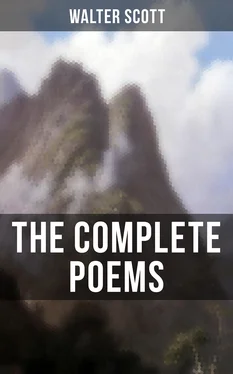XXVII
The anxious crowd, with horror pale,
All trembling heard the wondrous tale;
No sound was made, no word was spoke,
Till noble Angus silence broke;
And he a solemn sacred plight
Did to St. Bride of Douglas make,
That he a pilgrimage would take
To Melrose Abbey, for the sake
Of Michael’s restless sprite.
Then each, to ease his troubled breast,
To some bless’d saint his prayers address’d:
Some to St. Modan made their vows,
Some to St. Mary of the Lowes,
Some to the Holy Rood of Lisle,
Some to our Ladye of the Isle;
Each did his patron witness make,
That he such pilgrimage would take,
And monks should sing, and bells should toll,
All for the weal of Michael’s soul.
While vows were ta’en, and prayers were pray’d,
‘Tis said the noble dame, dismay’d,
Renounc’d, for aye, dark magic’s aid.
XXVIII
Nought of the bridal will I tell,
Which after in short space befell;
Nor how brave sons and daughters fair
Bless’d Teviot’s Flower, and Cranstoun’s heir:
After such dreadful scene, ‘twere vain
To wake the note of mirth again.
More meet it were to mark the day
Of penitence, and prayer divine,
When pilgrim-chiefs, in sad array,
Sought Melrose’ holy shrine.
XXIX
With naked foot, and sackcloth vest,
And arms enfolded on his breast,
Did every pilgrim go;
The standers-by might hear uneath,
Footstep, or voice, or high-drawn breath,
Through all the lengthen’d row:
No lordly look, nor martial stride;
Gone was their glory, sunk their pride,
Forgotten their renown
Silent and slow, like ghosts they glide
To the high altar’s hallow’d side,
And there they knelt them down:
Above the suppliant chieftains wave
The banners of departed brave;
Beneath the letter d stones were laid
The ashes of their fathers dead;
From many a garnish’d niche around,
Stern saints and tortur’d martyrs frown’d.
XXX
And slow up the dim aisle afar,
With sable cowl and scapular,
And snow-white stoles, in order due,
The holy Fathers, two and two,
In long procession came;
Taper and host, and book they bare,
And holy banner, flourish’d fair
With the Redeemer’s name.
Above the prostrate pilgrim band
The mitred Abbot stretch’d his hand
And bless’d them as they kneel’d
With holy cross he sign’d them all,
And pray’d they might be sage in hall,
And fortunate in field.
Then mass was sung, and prayers were said,
And solemn requiem for the dead;
And bells toll’d out their mighty peal,
For the departed spirit’s weal;
And ever in the office close
The hymn of intercession rose;
And far the echoing aisles prolong
The awful burthen of the song,
Dies Iræ, Dies Illa,
Solvet Sæclum in Favilla,
While the pealing organ rung.
Were it meet with sacred strain
To close my lay, so light and vain,
Thus the holy Fathers sung:
XXXI
Hymn for the Dead
That day of wrath, that dreadful day,
When heaven and earth shall pass away,
What power shall be the sinner’s stay?
How shall he meet that dreadful day?
When, shrivelling like a parched scroll,
The flaming heavens together roll;
When louder yet, and yet more dread,
Swells the high trump that wakes the dead:
Oh! on that day, that wrathful day,
When man to judgment wakes from clay,
Be Thou the trembling sinner’s stay,
Though heaven and earth shall pass away!
Hush’d is the harp: the Minstrel gone.
And did he wander forth alone?
Alone, in indigence and age,
To linger out his pilgrimage?
No; close beneath proud Newark’s tower,
Arose the Minstrel’s lowly bower;
A simple hut; but there was seen
The little garden hedged with green,
The cheerful hearth, and lattice clean.
There shelter’d wanderers, by the blaze,
Oft heard the tale of other days;
For much he lov’d to ope his door,
And give the aid he begg’d before.
So pass’d the winter’s day; but still,
When summer smil’d on sweet Bowhill,
And July’s eve, with balmy breath,
Wav’d the blue-bells on Newark heath;
When throstles sung in Harehead-shaw,
And corn was green on Carterhaugh,
And flourish’d, broad, Blackandro’s oak,
The aged Harper’s soul awoke!
Then would he sing achievements high,
And circumstance of chivalry,
Till the rapt traveller would stay,
Forgetful of the closing day;
And noble youths, the strain to hear,
Forsook the hunting of the deer;
And Yarrow, as he roll’d along,
Bore burden to the Minstrel’s song.
Table of Contents
Advertisement
Canto I
Canto II
Canto III
Canto IV
Canto V
Canto VI
TO
JOHN R. S. MORRITT, ESQ.
THIS POEM,
THE SCENE OF WHICH IS LAID IN HIS BEAUTIFUL
DEMESNE OF ROKEBY,
IS INSCRIBED,
IN TOKEN OF SINCERE FRIENDSHIP,
BY
WALTER SCOTT.
DEC. 31, 1812.
Table of Contents
The scene of this poem is laid at Rokeby, near Greta Bridge, in Yorkshire, and shifts to the adjacent fortress of Barnard Castle, and to other places in that vicinity.
The time occupied by the action is a space of five days, three of which are supposed to elapse between the end of the Fifth and beginning of the Sixth Canto.
The date of the supposed events is immediately subsequent to the great battle of Marston Moor, 3d July, 1644. This period of public confusion has been chosen, without any puipose of combining the Fable with the Military or Political Events of the Civil War, but only as affording a degree of probability to the fictitious narrative now presented to the Public.
Конец ознакомительного фрагмента.
Текст предоставлен ООО «ЛитРес».
Прочитайте эту книгу целиком, купив полную легальную версию на ЛитРес.
Безопасно оплатить книгу можно банковской картой Visa, MasterCard, Maestro, со счета мобильного телефона, с платежного терминала, в салоне МТС или Связной, через PayPal, WebMoney, Яндекс.Деньги, QIWI Кошелек, бонусными картами или другим удобным Вам способом.







